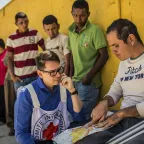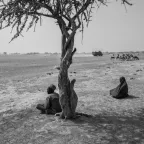Zimbabwe: Separated by distance, connected by wifi
… in Chipinge, eastern Zimbabwe, without any family at the end of 2017. “I don’t have any … Remmy respectively. They work together with Restoring Family Links field officer Lilian Musimwa at the …
… in Chipinge, eastern Zimbabwe, without any family at the end of 2017. “I don’t have any … Remmy respectively. They work together with Restoring Family Links field officer Lilian Musimwa at the …
A perfect storm of converging trends in global warfare is changing how the ICRC needs to think about helping those caught in conflict. ICRC President Peter Maurer addresses the National Press Club …

… becoming a pilot in the future. Through the Restoring Family Links program in partnership with the Kenya …
… within our areas of expertise, such as restoring family links, visiting detained migrants and …

… Red Cross, is taking action to restore links between separated and missing family members. In Jamaica, over 70 students … the ICRC organised two regional workshops on Restoring Family Links and activities in favor …
… intelligence on enemy forces. Furthermore, family members of civilians killed choose to … Department of Defense personnel (to include family members), resources, facilities, and … be given to the destruction of a house if a family is still living in it and is displaced …
… to search for missing persons and restore family links. When we learned about the case of the Yevtushenko family and the fact that the youngest brother …
… activities. 63 tracing requests to restore family links were processed and 30 Red Cross messages …
… support in its field of expertise including restoring family links, detention of migrants, and other …

… Burundi or Tanzania,” said Talent Moyo, ICRC Restoring Family Links Assistant. “Where we have a positive, …
Try one of the following resources:
Created in 1863, the ICRC library, alongside the ICRC archives, provides an indispensable documentary reference on the organization itself and international humanitarian law.
International humanitarian law is based on a number of treaties, in particular the Geneva Conventions of 1949 and their Additional Protocols, and a series of other instruments.
Customary international humanitarian law consists of rules that come from "a general practice accepted as law" and that exist independent of treaty law.